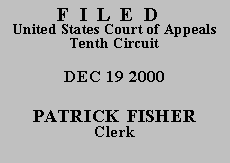

| UNITED STATES OF AMERICA,
JONATHAN BENALLY, |
No. 00-2125
(D.C. No. CIV-99-649 SC) |
The facts of this case are set out in detail in this court's opinion on direct appeal, United States v. Benally, No. 96-2296, 1998 WL 339688 (10th Cir. June 24, 1998). We summarize them briefly here. On October 3, 1995, Jonathan Benally was drinking with friends. He met, drank with, and then fought Russell John later that night. Benally was found by a federal jury to be guilty of second degree murder for beating John to death. At trial it was stipulated that Benally and John were enrolled members of the Navajo tribe and that the altercation took place within the boundaries of the Navajo Indian Reservation in the State of New Mexico. The federal trial court had jurisdiction under 18 U.S.C. § 1153, which provides for the application of select criminal laws (including murder and manslaughter) to crimes committed in Indian country by Native Americans, and 18 U.S.C. § 3231.
At the outset, we consider whether Benally filed a timely habeas appeal. We conclude that he did. The district court dismissed Appellant's § 2255 motion on January 11, 2000. See Doc. 11. The deadline for filing this appeal was Monday, March 13, 2000 sixty days from dismissal of Benally's motion (Saturday, March 11, 2000), forwarded to the next working day. See Fed. R. App. P. 4(a)(1)(B) (sixty days); Fed. R. App. P. 26(a)(3) (push deadline to next working day). The envelope in which Benally's Notice of Appeal was mailed was postmarked March 13, 2000. See Record Folder, attached to left side (Marked "A"); see also Fed. R. App. P. 4(c)(1) (establishing "mailbox rule" for inmates). Benally mistakenly sent this notice of appeal to the court of appeals, rather than to the district court. When this happens, however, Federal Rule of Appellate Procedure 4(d) (formerly 4(a)(1)) provides that the notice shall be deemed filed and transmitted to the district court. See Knox v. Wyoming, 959 F.2d 866, 867-68 n.2 (10th Cir. 1992). Thus, the mailbox rule for inmates, Rule 4(c)(1), and the de jure transmittal to the district court, Rule 4(d), combine to make this appeal timely.
In his appellate brief, Benally raises six issues: (1) ineffective assistance of counsel; (2) failure to instruct the jury on the lesser included offense of involuntary manslaughter; (3) violation of Miranda v. Arizona; (4) speedy trial violation; (5) improper refusal to reduce his sentence for acceptance of responsibility; and (6) unconstitutional racial discrimination in selection of the grand and petit juries. This court considered and rejected issues two and five on direct appeal, see Benally, 1998 WL 339688, at *3-5, and Appellant does not raise any new facts or legal arguments in his habeas petition. Similarly, the magistrate judge on habeas review considered and rejected the substance of all six issues. See Doc. 8 (Magistrate Judge's Proposed Findings and Recommended Disposition, filed October 29, 1999). The district court adopted the magistrate judge's findings and recommended disposition. See Doc. 11. While Benally formulates these issues in different ways in this appeal, we believe the substance of each issue has previously been correctly dealt with by a court in the course of these proceedings. After reviewing the substance of each claim, we agree with the district court that Appellant has failed to make a substantial showing of a denial of a constitutional right. See 28 U.S.C. §2253(c)(2); see also Doc. 13 (district court's denial of certificate of appealability for same reason).
Therefore, for substantially the reasons stated in the district court's order and the magistrate judge's findings and recommended disposition, we decline to issue a certificate of appealability. Since this appeal is without merit, we deny his motion to proceed in forma pauperis. See Fed. R. App. P. 24. This appeal is accordingly DISMISSED.
ENTERED FOR THE COURT
David M. Ebel
Circuit Judge
*.After examining the briefs and appellate record, this panel has determined unanimously to grant the parties' request for a decision on the briefs without oral argument. See Fed. R. App. P. 34(f) and 10th Cir. R. 34.1(G). The case is therefore ordered submitted without oral argument. This Order and Judgment is not binding precedent, except under the doctrines of law of the case, res judicata, and collateral estoppel. The court generally disfavors the citation of orders and judgments; nevertheless, an order and judgment may be cited under the terms and conditions of 10th Cir. R. 36.3.